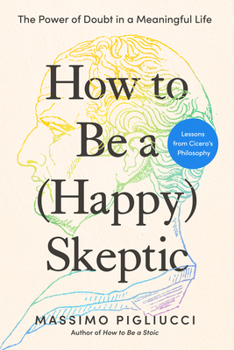How to Be a (Happy) Skeptic: The Power of Doubt in a Meaningful Life--Lessons from Cicero's Philosophy
Celebrated CUNY philosopher Massimo Pigliucci investigates the practical applications of Cicero's skepticism, weaving together ancient wisdom, personal narrative, and practical insights to help readers find meaning through doubt Throughout history it has always been true that people don't know as much as they think they do. The ancient Greeks and Romans formulated an approach to life based on this notion. They recognized that adjusting our beliefs to the evidence while keeping in mind that we could be mistaken is the path to a just society--and a happy and meaningful life. In How to Be A (Happy) Skeptic, philosopher Massimo Pigliucci adopts the ancient Roman public advocate, orator, statesman, and philosopher Marcus Tullius Cicero as his guide to reveal the benefits of cultivating curiosity and doubt in the pursuit of a life worth living. Cicero's skeptical philosophy is more relevant than ever in our current age of misinformation. Following Cicero's life and works, Pigliucci explores the foundations for a good life, from how to formulate our values to how to nurture friendships; from being a good citizen and fighting for social justice to handling grief, pain, and even death. Skepticism as a philosophy was developed during a time of violence, social upheaval, and political turmoil. Taking a page from Cicero's book, we, too, can adopt a practical philosophy of reason and learn to live well through uncertain times.
Format:Hardcover
Language:English
ISBN:B0FRDZ9KN5
ISBN13:9798217179671
Release Date:June 2026
Publisher:Tarcher
Length:352 Pages
Weight:0.95 lbs.
Dimensions:0.8" x 5.5" x 8.3"
Related Subjects
Business Business & Investing Economics Philosophy Self Help Self-Help Self-Help & PsychologyCustomer Reviews
0 rating





